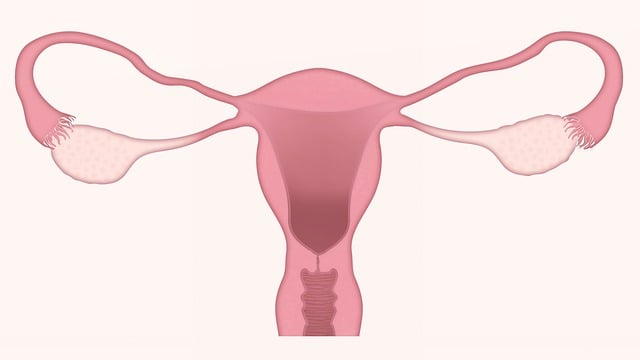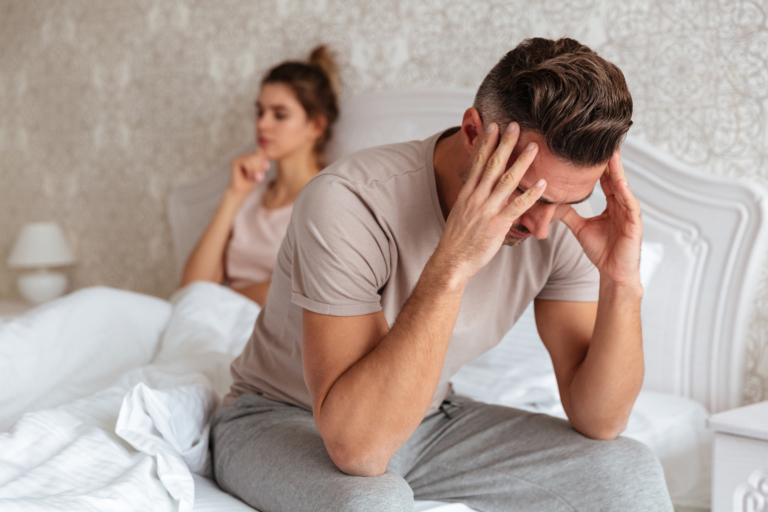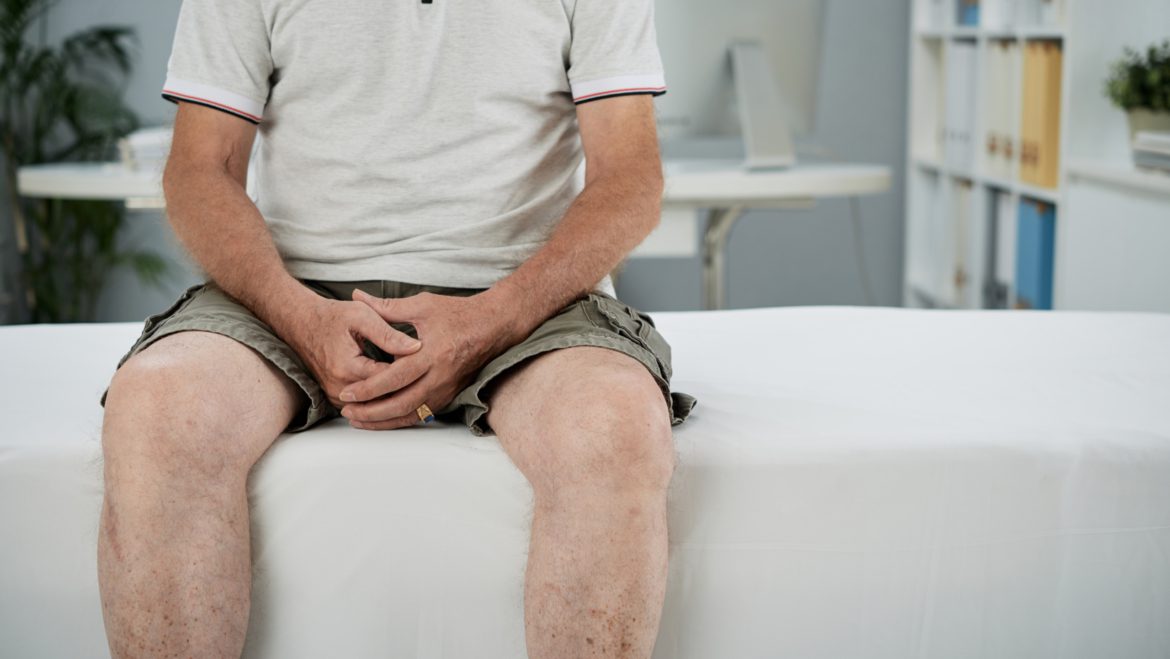Male Erectile Dysfunction: Everything you need to know
With premature ejaculation, erectile dysfunction (also called “sexual impotence”) is the most common cause of complaints from men seeking authentic tantric massage.
Erectile Dysfunction is the inability to get or keep an erection long enough for penetration. Causes can be physical or emotional, this second is the most common cause.
An erection cannot be forced – on the contrary, every man knows that any attempt to force an erection or even desire one will only end in not having one. Those who are conditioned to solve problems through willpower are powerless against their genitals, which obey no orders. The more an erection is “demanded”, the flaccid your penis will be. Fear and erections just don’t go together.
An erection requires external stimulation and internal receptivity. It is only when a man is relaxed and comfortable with your company that he can begin to feel sexually stimulated by touch, smell, your thoughts or a look, massage or caress. These impulses stimulate the nervous system and erotic centers, causing the brain to release hormones that the parasympathetic nervous system needs to become active.
The parasympathetic nervous system slows breathing and heart rate and becomes active as we calm down, amplifying our state of relaxation. When we are relaxed in this way, the “inlet arteries” to the penis are able to open, releasing blood into the erectile tissue. This increased blood flow also puts pressure on the veins, virtually closing them off so that blood cannot flow. This increases the volume of the erectile tissues three to four times, and we have an erection. Although it usually happens after an erotic stimulus, erections can occur in any situation where there is stimulation of the sympathetic system, such as inside a shaking car or during sleep:: every 70 to 100 minutes, sleeping men have an erection, even no erotic dreams. It’s part of the body’s inner workings to regularly deliver oxygen to the penis – it’s just part of a healthy routine.
Any sexual problem can make men feel insecure, but nothing makes a man panic like the loss of his erection.
When a man feels that he can be himself and be accepted for it, no matter what happens, the psychological problems related to his erectile dysfunction are likely to resolve themselves. There are, of course, men who will still have trouble achieving or maintaining erections, whether for physical, age-related or emotional reasons external to the relationship. Open conversation can be a stepping stone to a new, deeper level of intimacy.
Finally, it’s important to stay playful with all of this; it’s not about performance or effort points. A person’s sexuality is as unique as their fingerprints.
Read more: Benefits of Tantric Massage
Within the emotional spectrum, often behind an “I can’t” is an unconscious “I don’t want to”. Honoring and embracing this “not wanting” allows you to ask yourself what you really want. Here a magic question can help: “If I woke up tomorrow and my sexual problem was magically solved, by what feeling would you perceive it and how would you live?”
Other emotional issues may also be involved: ask yourself if you accept your partner as they are, not necessarily as you think they should be. Is there anything else the two of you can do to help each other leave behind old gender and performance roles and expectations?
Are you able to recognize the depth of your natural sexual desires, as well as those of your partner? Embark on a quest together – sexuality can only work on the basis of equality and complicity.
In the normal state, without sexual arousal, the sympathetic nervous system is active; it stimulates heartbeat and breathing and causes the “inlet arteries” in the penis to constrict. With little blood, he becomes flaccid.
Stress and fear increase the activity of the sympathetic nervous system and trigger the release of adrenaline – and blood leaves the penis to be distributed to other parts of the body. Relaxation is an essential factor for a strong and lasting erection.
Relaxation, however, is something that seems very strange to many of us: from childhood, we receive signals that we should perform on many levels. “You mean I don’t have to work hard to get an erection?” is a question we all ask when we realize this. The less you think about having one, the more likely you are to have one.
Many men come to me complaining of erectile dysfunction and, right in the first session, after breathing exercises to improve the state of presence and an extensive relaxing and loving massage, the erection just happens. Just feel, breathe and enjoy.
Understand the physical causes for erectile dysfunction
Until about thirty years ago, people thought that erection problems were exclusively the result of psychological causes. But physical factors play a role in chronic erectile dysfunction. These factors include:
Arteriosclerosis: Accumulation of fat in the walls of the arteries, causing their “clogging”. Certain lifestyle choices can make arteriosclerosis worse, including stress, lack of movement, excessive salt use, and a diet high in trans fats.
This is the most common cause of erectile dysfunction because it is correlated with many systemic diseases that affect blood vessels in the genital area, directly or indirectly. Chronic diseases, such as diabetes mellitus, high cholesterol and others, lead to the destruction of the contractile walls of the veins, or cause hardening, narrowing or blockage of the arteries that reach the penis.
Penile erection happens when blood, carried by the arteries of the penis, swells the erectile bodies made of spongy tissue. Any failure in this filling mechanism, such as narrowing of the arteries and atherosclerotic plaques, can lead to erectile failure. The erection is maintained by a physiological trapping of blood flow accumulated in the penis, via blood vessels. Any failure of this mechanism (relaxation of the penile vascular system) results in less rigid erections or inability to maintain them long enough to complete intercourse.
Vascular insufficiency is perhaps the cause that most correlates with age. Generally, impotence caused by vascular factors seems to slowly increase over months or years, causing a decrease in the firmness of erections, to finally become the predominant factor.
The diagnostic approach to vascular disease is to investigate it with ultrasound, through a method called Doppler cavernossonogram, which is able to show the color image of blood flow in the penis.
Medications and Drugs
More than 200 prescription drugs are known to affect erectile function in men. In fact, there are so many, and for so many conditions, that this must be one of the main causes of organic impotence. Some of these drugs promote impotence by acting on the Central Nervous System. Others affect the amount of blood supply to the penis or promote thinning of blood vessels.
Among them are:
1. Medicines used to treat high blood pressure (high blood pressure), such as spironolactone and thiazide-based diuretics, as well as beta-blockers;
2. Medicines used to treat depression (antidepressants) and anxiety (anxiolytics), such as phenothiazine;
3. Medicines used to treat neurological disorders such as Parkinson’s disease and others;
4. Medicines used to treat gastrointestinal problems, such as cimetidine;
5. Medicines used to treat allergies.
Furthermore, the abuse of substances like alcohol, tobacco, cocaine and other drugs is also the important cause of impotence these days. It is ironic that these substances of abuse are considered aphrodisiacs by their users when taken in small amounts, but are addictive when used systematically. A glass of wine during a romantic date can “release” inhibitions and decrease performance anxiety or other inhibiting psychological factors. A mild anxiolytic can have the same effect. Some smokers are calmed down by slowly enjoying a cigarette, pipe, or cigar. For some people, the powerful sense of well-being that accompanies the ingestion of cocaine, methamphetamines and other drugs can act as a sexual arousal. However, chronic abuse and high doses of these substances have the opposite effect.
More than 80% of alcoholics suffer from chronic sexual impotence. Scientific studies have shown that chronic smokers have major damage to their genital blood supply system.
Neurological damage
Nerve diseases or damage to the nerves that control the erection process are also among the most common causes of impotence.
The large increase in the incidence of hyperplasia and prostate cancer in recent decades is one of the main reasons. Prostate surgery damages nerves in over 80% of cases. Some of these patients recover sexual function, completely or partially, after a year or more, but most remain impotent for life. Radiation therapy for prostate cancer, although less traumatic, also has an effect on sexual potency. Other pelvic surgeries can have a deleterious effect on the erection.
Another cause of impotence is trauma to the groin. This is more common than we think, particularly in some sports.
Recently, a group of researchers discovered that riding a bicycle can be the main cause of impotence, because strong blows of the perineum (the triangle between the anus and the base of the scrotum) against the front bar of the bicycle are very harmful. It remains to be seen whether the constant, low-intensity trauma caused by rubbing the perineum against the seat could also be responsible for erectile dysfunction.
Some nervous diseases strongly affect the ability to achieve an erection, because they act on brain structures that are responsible for the central control of the sexual impulse and its performance. They are: Parkinson’s disease and other disorders of the motor system, stroke, multiple sclerosis, some tumors of the brain and pituitary gland, and epilepsy. Affections in the spinal cord or in the nerves that come or go to the genital area, such as compression of the vertebral discs or traumatic affections such as paraplegia and tetraplegia, or in regional paralysis, can affect sexual performance, causing partial or total impotence.
Structural damage to the penis. There are less common diseases (for example, fibrosis of penile tissue) caused by organic diseases, Peyronie’s disease (it causes an abnormal curving of the penis) and cysts and tumors.
Hormonal disorders
Approximately 5 to 10% of the male population suffers from some type of hormonal disorder. The most common, also related to age, is the constant decrease in testosterone levels, the main sex hormone in men. It probably has something to do with the decreased ability of testicular cells to synthesize the hormone. This phenomenon has led some experts to state that there is a type of “menopause” for men, not as drastic as for women, called andropause. Although this is controversial, the fact is that many metabolic precursors of testosterone (substances used by the body in the synthesis process) such as DHEA (dehydroxyepiandrosterone), decrease significantly with age.
A decrease in testosterone has been associated with a decrease in sexual libido and performance, because brain circuits and penile tissues are dependent on these levels of hormones. However, a significant percentage of men with low testosterone levels remain with unaffected sexual performance. When low testosterone levels affect primary and secondary sexual characteristics (for example, when beard growth is considerably slow, or there is loss of hair on the chest or pelvis, or even atrophy of the testicles and penis, and an increase in the region of the breasts called gynecomastia), a condition called hypogonadism (of gonads, or sex gland) is said to occur. There are two types of hypogonadism:
1. Primary hypogonadism, caused by a disease in testosterone-producing cells;
2. Secondary hypogonadism, caused by disease or dysfunction in the systems that control testosterone production, such as the pituitary gland. The most common form of secondary hypogonadism is called Hypogonadotropic Hypogonadism, because there is a demonstrable decrease in the levels of FSH (Follicle Stimulating Hormone), or gonadotropic hormone, which is produced by the pituitary gland. Primary Hypogonadism, in contrast, has normal or even increased FSH levels.
Another condition that can often lead to sexual impotence is called hyperprolactinemia, which is an abnormal increase in another hormone produced by the pituitary gland called prolactin. In women, prolactin is responsible for stimulating the mammary glands to produce milk. Men normally have low levels of prolactin, but in some conditions they can be increased, such as a type of benign tumor called a prolactinoma.
In diagnostic tests done to diagnose the causes of sexual impotence, the doctor usually orders laboratory tests designed to measure the level of testosterone, FSH and prolactin. Simultaneously low levels of testosterone and FSH signify a diagnosis of Hypogonadotropic Hypogonadism. Hyperprolactinemia is also often associated with this condition.
Our therapists research the body’s potential to readapt itself to stimuli that provoke a reinterpretation of the body’s potential for pleasure. Our research demonstrates that the human body reacts to pleasure stimuli by seeking adaptive resources, since the main memory related to orgasm is linked to one of the most important aspects of the human being: the ability to reproduce and eternalize oneself.
Based on human instinct and the species’ ability to adapt, we realize that the human body reorganizes the sensory synapses that take information to the brain, reactivating the conditions conducive to orgasm and pleasure.
There are numerous other orgasm possibilities, such as dry orgasm, which can benefit men who have undergone radical removal of the prostate through surgery.
Each man needs to go through a set of therapeutic situations that will reproduce the necessary stimuli to experience new experiences of orgasm and pleasure.
Summary of physical causes
• High blood pressure: If you have high blood pressure, you can reduce it by reducing your stress levels, changing your diet and increasing your exercise. The medication will regulate blood pressure, but it can also have side effects influencing your ability to achieve and maintain erections.
• Smoking: Excessive smoking not only leads to clogging of the penile arteries, but also damages the sealing mechanism of the veins.
• Obesity.
• High cholesterol.
• Alcohol abuse: Excessive alcohol use can cause circulation problems, as well as a degeneration of the mamillary body in the brain, which is responsible for our sexual behavior. It is well known that small amounts of alcohol can cause relaxation and lower inhibitions, but once a person has had too much, hardly anything will happen down there.
• Blood flow problems in the perineum: Blood flow to the perineum can be negatively affected by stress, certain sports (such as cycling) or specific occupations. Sitting too much can also affect circulation to the penis, as can underwear or pants that are too tight.
• Nervous System Problems: The nervous system transmits sexual stimuli and ensures that certain enzymes are directed to the genital region. Surgery (especially in the prostate), injuries, neurological diseases, Parkinson’s disease and spinal problems (especially in the sacrum area) can interfere with erectile function, as can nervous tension.
• Metabolism and diabetes problems: More than 50% of men who suffer from diabetes will become impotent during their lifetime; Diabetes not only blocks blood vessel walls, but also damages nerves, preventing nerve impulses important for an erection from being transmitted.
• Hormonal disorders: Male sex hormones are formed in the Leydig cells of the testes as well as in the adrenal glands. If there are not enough hormones to sustain erections, many men turn to aphrodisiacs or take PDE-5 inhibitors such as Viagra, which offer only temporary relief.
Many think that the magic formula for arousal is very simple: more testosterone = more arousal, but this is not true. There is a pre-hormone called dehydroepiandrosterone (or DHEA) that contributes to sexual desire. DHEA is produced by the adrenal glands and is a precursor to other sex hormones, including testosterone and estrogen.
• Overstimulation: The adrenal glands deal with stress and excitement. Prolonged excessive stress on the adrenal glands – from overwork or even excessive pornography use – can lead to erection problems. This can make you need an increasingly strong stimulus to get erect.
• Stress: Under the influence of stress hormones, the testicles reduce testosterone production. In both men and women, stress also leads to reduced production of DHEA. Stress is therefore counterproductive to both an erection and the ability to become aroused.
How to strengthen the erection capacity?
To promote good erections, we have to promote energy flow to the penis.
Anyone, regardless of age, can promote oxygen supply to the body and maintain elasticity through certain exercises. The following is a list of practices that improve erection.
• Breathing practices: Always abdominal, relaxed in the pelvic floor, testicles and penis.
• Sports and dance: skiing (stimulates circulation in the pelvis), tennis (stimulates the ability to react to stimuli), dances that promote loosening of the hips, such as Latin dances (salsa, zouk, bachata, samba, etc…), resistance.
• Pelvic Floor Strengthening: Increases circulation in the pelvic area.
• Pelvic exercises: rocking, lifting, rocking the pelvis, among other movements.
• Body pump: Exercise programs are very good at promoting circulation in the pelvic area. Classes are offered at many gyms.
• Chi Kung: Ten minutes a day promotes the free flow of energy throughout the body.
• Feldenkrais exercises: promote deep relaxation and resolve stress at the cellular level. The “pelvic clock” exercise is particularly helpful for penile health.
• Hot and warm baths: stimulate circulation.
• Bodybuilding: leg press, abdominal training and others.
• Skating: stimulates circulation in the pelvis.
• Trampoline: about 15 minutes to strengthen blood vessel walls
• Yoga: Asanas like the cobra not only promote circulation, but also improve overall body elasticity.
Authentic Tantra massage and its benefits for erectile dysfunction
Tantric massage offers an important way of restoring the natural and spontaneous functioning of the man’s body, in addition to offering the incredible possibility of the man becoming less dependent on an erection to experience a satisfactory sex life, if he has a diagnosed health problem.
The human body has an incredible adaptability, reorganizing the sensory synapses that take information to the brain, reactivating the conditions conducive to orgasm and pleasure when there is a need to change the way we experience pleasure in the body.
For a man who experiences satisfactory erections in his experiences of excitement, what is happening is a robust process of vascularization of the entire genital region, causing an erection and, mainly, an increase in the sensitivity to pleasure of the tissues that make up the penile glans and the body of the penis (or Lingam, as we call it in the Tantra tradition).
Thus, there is a high potential for pleasure being available with stimuli in these two parts of the penis, whether manual, oral or penetration. However, when the mechanisms that induce erection are absent, there is a reduction in the spontaneous mechanism that enhances the arrival of blood to the penis, but the sensory potential is still present, after all, the nerve endings are all still available. In addition, the body still has the ability to move an energy charge of a bioelectric nature.
It is in these two aspects (enjoying the sensory potential of tissues and moving bioelectricity) that work with tantric massage comes into play. The combination of techniques that brings together tantric massage, appropriate and correctly oriented and performed vibrational exercises, as well as the use of conscious breathing in the process of energizing the body. These combined therapeutic resources enable a process of recovery of the potency of expressing sexual energy.
During the tantric massage process, the person is led to enhance the movement of vital energy through the body, something that we almost do not do in conventional sex (sex drive), which suffers from excessive genitalization and the rush to “channel” the energy for ejaculation . After all, there is a huge fear surrounding the loss of erection and the need to give pleasure to the other person. By moving vital energy throughout the body, we awaken “sleeping” regions to new sensations and enhance the body’s ability to adapt to new ways of experiencing and moving pleasure.
It is a therapeutic process based on the body and touch; speech only helps in raising intentions, interpreting sensations and directing the process. Furthermore, it is important to say that tantric massage explores the whole body, from head to toe. An important aspect has to do with rescuing a certain naturalness in dealing with the body and pleasure, without the egoic burden of having to satisfy the other or be accepted by the other. “If there is a person who is ashamed or blocked, it is for them that I most indicate tantra”.
My name is May Gonzalez, I am tantric massage teacher and sexual re-education. I guide you, through special and contemporary techniques, to control anxiety, stress and improve your sex life. Getting to know your body and its sensory perception of arousal will free you from frustrations and will give you real pleasure and a prolonged feeling of well-being in return.
This is how I conduct a Tantra massage session.
Each session is tailored to each person’s needs.
Work that I am extremely grateful for all the transformations, discoveries, gifts, stories, awareness, exchanges, shares, relationships and beauties that it has given me and gives me every opportunity to experience and attend.
Book an appointment with me
keep update
connect with me
read more!

Yoni egg is a polished egg-shaped stone or crystal that used for pelvic floor exercises inside the Yoni. Yoni in Sanskrit mean womb, receptacle, origin or source; root cause of

Many people who look for my work are energetically exhausted and somehow cannot find a way out, they are people with emotional problems, traumas, depression, anxiety, existential crises, people who

Vaginismus is the body’s automatic reaction to the fear of some or all types of vaginal penetration Involuntary contraction of the muscles in the pelvic and vaginal region causes pain and

Premature ejaculation indicates the loss of voluntary control of the ejaculatory reflex. Some experts define premature ejaculation as ejaculation that occurs less than 2 minutes after penetration or in less

Low libido can come from several external and internal factors, being caused by stress, anxiety, use of medications such as antidepressants or antihypertensives, relationship problems, sex without orgasm, emotional problems,

Premature ejaculation is a condition that is characterized by uncontrolled ejaculation shortly after or before sexual penetration. It can happen with very little or no sexual arousal of the person. This


